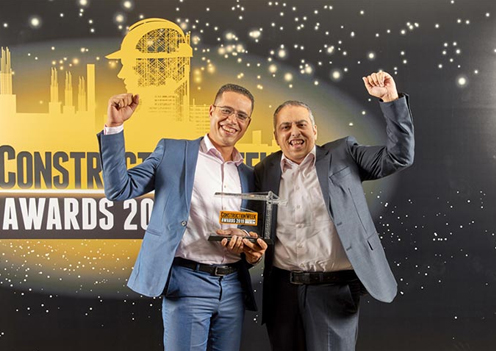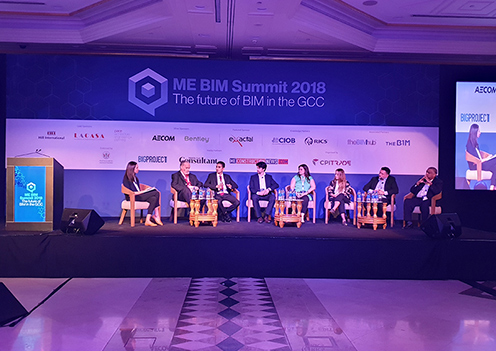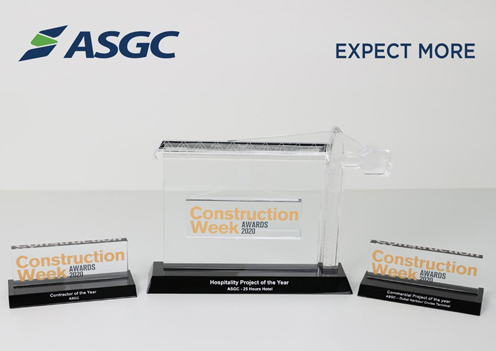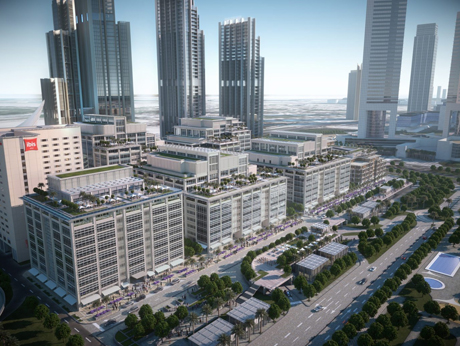Mariam Azmy, chief HR officer at ASGC talks growing up in a construction family and following in the footsteps of trailblazers

Following its special edition dedicated to women in the construction industry, Middle East Consultant continues to share the inspiration and experiences of women working in the male-dominated industry across the GCC. Here, we catch up with Mariam Azmy, chief HR officer at ASGC.
What drove you to get into construction and your very first role in the industry?
Growing up in a construction family, I spent a lot of time watching people around me work. I listened to how they spoke to clients on the phone, and made sure people got what they were looking for. I was around these conversations every day, and my interest grew. I have also lived in Dubai long enough to witness its transformation into a high-rise-city. This early influence played a huge role in my ultimate career path.
Despite this, however, my very first job was in banking. There I saw even more clearly how important customer service was, and there was a natural line between this observation and the HR opportunity I was later presented with in construction. Joining ASGC certainly seemed like a challenge, especially back in the early 2000s, when there were even fewer women in the industry, but I recognised this was an incredible opportunity.
More specifically, I saw how much more the ‘human touch’ was needed in human resources in an industry like this where so much is driven by machines, automation and deadlines. I was determined to support a family atmosphere at ASGC that would drive productivity, performance and profit. That vision has guided my focus in all the years since.
Share a brief about your career, mentioning key achievements with regards to your role.
Currently I am the chief human resources officer at ASGC, a post I have held since 2020 after a decade and a half within the firm. Throughout my tenure, I have worked to embed the modern employee-centric culture we now enjoy in the organisation today, which supports individual performance whilst also providing opportunities for growth and development. I am also responsible for executing global capital leadership with in-depth knowledge of HR in all areas.
Under my leadership, the HR team has fostered a unique family feel and culture in the company that I am proud of—not just because it is the right thing to do, but because it has driven a substantial increase in strategic achievement, productivity and profitability. I also have an ethical and authentic approach to human resources, often implementing employee-centric policies and procedures well in advance of government mandates. As a CHRO, I maintain an open-door policy and am committed to honoring the contribution of each individual within ASGC, from junior office staff on up to senior leadership.
From the first introduction, through onboarding, and on into the day-to-day working environment, my team ensures that we maintain a workplace experience where all employees feel encouraged and empowered, achieving growth and success in their careers with ASGC. This commitment sustained us even during the pandemic, when we had to furlough staff because of the industry stand-still. I ensured that my team kept in touch with all employees we furloughed or sent back to their home countries. We were later able to restore more than 30% of furloughed talent to their former positions.
Besides fairness and being the right thing to do, diversity in the construction industry is important because of the value women can bring to employers, clients and customers. How have you made your mark in the industry working on projects specifically (your proudest moment)?
Being the CHRO, I personally oversee all employee related projects and offer extra emphasis on projects that support gender diversity. One of our projects is encouraging the approach of gender mainstreaming in early-years education by sponsoring awards for achievers in various engineering categories at the undergraduate and postgraduate degree programs at Heriot-Watt University. This allows young women to pursue education and careers in technology and other high-value occupations. Another project which I am highly proud of is providing sponsorship to our employees to pursue higher education in leading universities, which allows to improve organization productivity and profitability.
What are some of the barriers to women entering the construction industry? What was your personal experience?
The already male-dominated industry has for years developed its own culture inside the sector. This contributes to a lot of closed networks, insider camaraderie and methods of collaboration that might feel natural to a man … but specifically exclude the way many women think, connect and work.
This is especially seen on the construction sites themselves, but it is also visible within the corporate or administrative part of the sector. Women have had to ‘fit in’ in order to be accepted by the group. This can include shifting their natural presence to communicate in a more precise, direct and masculine way; dressing in styles that mimic men’s fashion (whether or not it feels comfortable); adopting an outcomes-driven focus to the exclusion of connection, collaboration and relationship; or adopting an attitude of bravado or overconfidence in order to be taken seriously.
Earning respect in this industry takes quite a lot. As women we are often judged by our gender and not our skills or experience.
The GCC construction sector is still male dominated, however diversity is beginning to increase. If you agree with the above line, comment on what is driving this and how you see the GCC markets changing in the coming years? If you do not agree with the first line of this question, please share your thoughts/views of the market.
Overall, the UAE is doing a great job of encouraging women to enter fields like construction, and incentivising companies to create more space for a diverse workforce. I’m thinking of DP World, for example, where the stated strategic outcomes and goals for the enterprise include inviting more female talent to the table. As DP World has said, “Enabling smarter trade is not a gender-based job.” The question this leaves for women is: ‘You have permission and support now even if the climb of the ladder is still a challenge. Will you go after the job you really want?’
Everyone has a part to play in diversity and equal pay. What would you like to see government authorities and construction firms do to increase diversity and make pay a level playing field?
I’m glad we agree that the playing field is not level. The equal pay laws between men and women recently implemented here in the UAE are a great step forward; however, there is still a great deal of discrimination based on nationality. I’d like to see that change–especially since we have actively worked against this within our organisation. As a mother of two both born while I am in the industry, I also speak as a mother – and I’d like to see continued improvement in the length of paid maternity and paternity leave requirements.
Besides authorities and construction firms, who else can play a part in increasing diversity and balancing pay scales?
I think it’s really important that individual employees and managers advocate for themselves, their colleagues and their teams. Change is often a ground-up process; at ASGC we encourage our employees to speak openly about these issues and vocalise their desires and needs. Some issues are obvious; I see them, and we address them. But there also might be hidden areas of inequality that only certain teams or individuals can recognise from their vantage point. It’s critical that each does his or her part to raise the issue and push for resolution—because a ‘win’ today in your department is a win for everyone who comes after you.
As a woman in the industry, what has your experience been working in the GCC construction sector? If you have worked in markets outside the GCC, how does your experience here compare with what you’ve experienced and observed in other markets?
Having worked in this industry for 17 years in the UAE, I must say that I have had the biggest opportunities and have been part of some of the biggest projects in the region. I have worked hand-in-hand with our excellent ASGC leadership, and this is a privilege I do not take lightly. I cannot speak for the experience of working in other markets, but I believe overall we’re blessed with remarkable openness and a great reduction in the glass ceilings that women and minority employees used to face in this region. With continued relentless effort, the future is bright.
In your opinion, what is the biggest challenge women in the construction sector face in GCC countries? How can these challenges be addressed?
Visibility is a huge issue here. Many women in this industry tend to ‘blend in’ as much as possible in construction companies and don’t get the exposure or the wider platform they need to inspire others to follow in their footsteps. Or, people assume that women in these companies are secretaries only, rather than serving at the C-suite level, as I do. There can be a tendency to discourage women from these industries or simply place them in the back, where they can’t be seen. It’s time to change that. And change requires tremendous will-power and resilience–as well as a commitment to being seen and heard–on the part of women in the industry.
Do you feel there’s a limit with regards to how far you can progress within your respective organisation?
Given that I have reached the top of my climb, no. Not at all. ASGC has been a fantastic and supportive place for growth. My 17 years of service speak for themselves. But even though I have reached the C-suite, there’s more to learn and always room to growth. That’s what makes it limitless.
How does the firm you currently work for approach diversity in the workplace? What more can your firm do to increase diversity?
At ASGC, we believe in creating a diverse culture at an early career stage by providing internships and graduate programs to women across various disciplines in the organisation. Creating and offering an equal platform is a critical part of leveling the internal playing field. We nurture the talent and guide them in their areas of expertise. We also promote them to be future leaders.
Over the past few years, we have diversified our senior management with a wide presence of strong and independent women, who have significantly contributed to the success of the organisation. An increase in women representation has led to a distinctive approach in critical decision making, which has enabled us to boost our profitability.
What advice would you give to a woman entering the GCC construction industry today?
My standard advice is: go for it! Your trail has been blazed by the amazing women who have gone before you, and your progress is welcomed and supported in many companies. Learn as much as you can. Take advantage of opportunities. And don’t be afraid to continually sell the value of your contribution by speaking about your results.
Source: meconstructionnews.com





